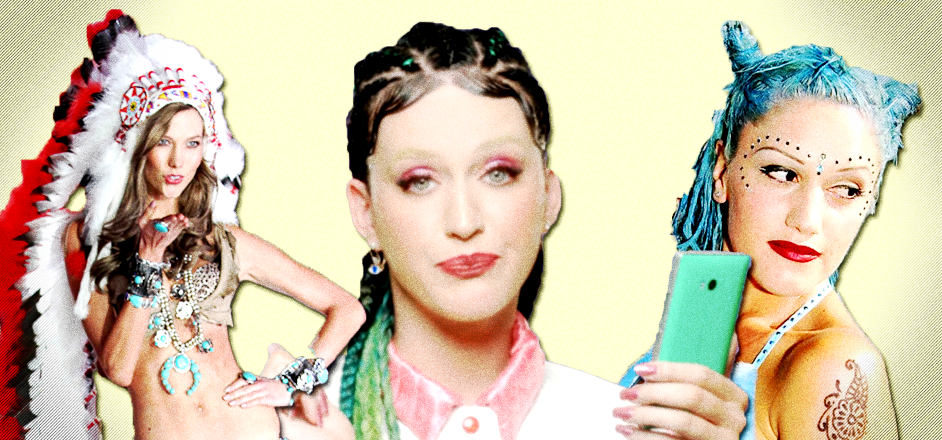For those of us with certain privileges, seeing Katy Perry in braids, Gwen Stefani in a bindi and henna, or Average Ashely in a pair of heeled mocassins and an Indian headdress at the music festival du jour doesn't register as anything other than a "fun" look — her style is so crazy! Wee!
However, for people from the cultures to which these style and beauty traditions belong, it can feel more like a mockery and misrepresentation than a cute outfit or accessory … especially when certain styles are worn by white people or others who have no cultural or spiritual understanding that the item is a tradition, not a "trend."
Cultural appropriation, everybody. Writer Maisha Z. Johnson described it expertly for Everyday Feminism, stating that it's "not only as the act of an individual, but an individual working within a 'power dynamic in which members of a dominant culture take elements from a culture of people who have been systematically oppressed by that dominant group.'" In other words, when artists, designers or everyday folks appropriate certain "looks," they get to profit from what they take — either in social or monetary currency — while the oppressed group gets nothing.
Katy Perry is truly the worst at it. Kendall and Kylie Jenner, too (they even pulled their entire t-shirt line this week amid backlash over its messaging). However, while they've all issued public apologies, many people from believe "sorry" isn't enough. That's why the United Nations has finally decided to intervene — by making cultural appropriation illegal.
Sorry, Coachella bro. No Native American headdress for you this Bonnaroo.

At a special committee meeting a few weeks back, The University of Colorado's Dean of Law James Anaya made a statement that the UN should "obligate states to create effective criminal and civil enforcement procedures to recognize and prevent the non-consensual taking and illegitimate possession, sale and export of traditional cultural expressions."
He made mention of one of the most salient examples of justifiably criminal cultural appropriation — Urban Outfitters' 2012 Navajo line, which appropriated the tribe's name and patterns for the middle-class masses with products like "Navajo hipster panties" and "Navajo flasks." The lawsuit was eventually settled out, but Anaya thinks we might see more cases like this in the future, especially if anti-appropriation laws — which are currently being drafted — pass.
However, it's not like you're going to get dragged to prison by a S.W.A.T. team if you wear a Redskins jersey to Brady's kegger or just happen have a feather on you in the wrong place at the wrong time. It's not that intense.
Rather, the UN's potential appropriation laws will target those who seek to profit from the folk art and traditions of other cultures, particularly large companies in the fashion and beauty industries who deliberately plagiarize indigenous cultures' aesthetics, spiritual practices, name or clothing. According to i-D, the UN has been asking for this kind of scrutinzation since 2001, but this year, with all the Katy Perry and K-Jenner mishaps, people finally seem to be interested in taking action.
Delegates from 189 countries recently met in Geneva as part of the UN's World Intellectual Property Organization to discuss what sort of sanctions would be appropriate for entities that "borrow" ideas from indigenous cultures for profit. Currently, they're drafting three articles of international law that would protect indigenous cultures from appropriation, including any fuckery that relates to property, design and language.
So, while this means your Coachella outfit won't necessarily land you an all-expenses paid vacation to jail, it does mean that, at the broadest level of government, validation is being given to people whose culture is mocked for profit. Probably best to leave your white-guy dreads, bindi and bedazzled headdress at home … or even, better, in a conveniently located Salvation Army drop-off location.




Leave a Reply